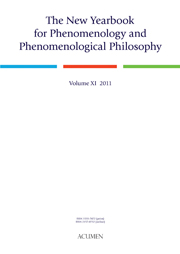Book contents
- Frontmatter
- Contents
- Articles
- Discussion
- Jacob Klein's Two Prescient Discoveries
- On the Mathematical Representation of Spacetime: A Case Study in Historical–Phenomenological Desedimentation
- Splitting the Movάς: Jacob Klein's Math Book reconsidered (Part I)
- History of Physics and the Thought of Jacob Klein
- Jacob Klein on the Dispute Between Plato and Aristotle Regarding Number
- Klein on Aristotle on Number
- The Philosophical Achievement of Jacob Klein
- In Review
- Conclusion
History of Physics and the Thought of Jacob Klein
from Discussion
- Frontmatter
- Contents
- Articles
- Discussion
- Jacob Klein's Two Prescient Discoveries
- On the Mathematical Representation of Spacetime: A Case Study in Historical–Phenomenological Desedimentation
- Splitting the Movάς: Jacob Klein's Math Book reconsidered (Part I)
- History of Physics and the Thought of Jacob Klein
- Jacob Klein on the Dispute Between Plato and Aristotle Regarding Number
- Klein on Aristotle on Number
- The Philosophical Achievement of Jacob Klein
- In Review
- Conclusion
Summary
Abstract: Aristotelian, classical, and quantum physics are compared and contrasted in light of Jacob Klein's account of the algebraicization of thought and the resulting detachment of mind from world, even as human problem-solving power is greatly increased. Two fundamental features of classical physics are brought out: speciesneutrality, which concerns the relation between the intelligible and the sensible, and physico-mathematical secularism, which concerns the question of the difference between mathematical objects and physical objects, and whether any differences matter. In contrast to Aristotelian physics, which is species-specific, classical physics is species-neutral. In contrast to both Aristotelian and quantum physics, classical physics assumes that any differences between mathematical objects and physical objects make no difference for the conduct of physics. Aristotle's act and potency, and Heisenberg's uncertainty principle are discussed as counterexamples to the physico-mathematical secularism of classical physics. The algebraicization of thought in conjunction with the disposition and program for the mastery of nature leads to the homogenization of heterogeneities in both mathematics and physics, and, therewith, to confusion concerning the meaning of human being and our place in the whole.
Keywords: Aristotelian physics; classical physics; intentionality; Jacob Klein; quantum physics; symbolic thinking.
The creation of a formal mathematical language was of decisive significance for the constitution of modern mathematical physics. … [T]his study … will confine itself to the limited task of recovering to some degree the sources, today almost completely hidden from view, of our modern symbolic mathematics. Nevertheless, the inquiry will never lose sight of the fundamental question, directly related as it is to the conceptual difficulties arising within mathematical physics today. However far afield it may run, its formulation will throughout be determined by this as its ultimate theme.
- Type
- Chapter
- Information
- The New Yearbook for Phenomenology and Phenomenological PhilosophyVolume XI 2011, pp. 214 - 248Publisher: Acumen PublishingPrint publication year: 2012



